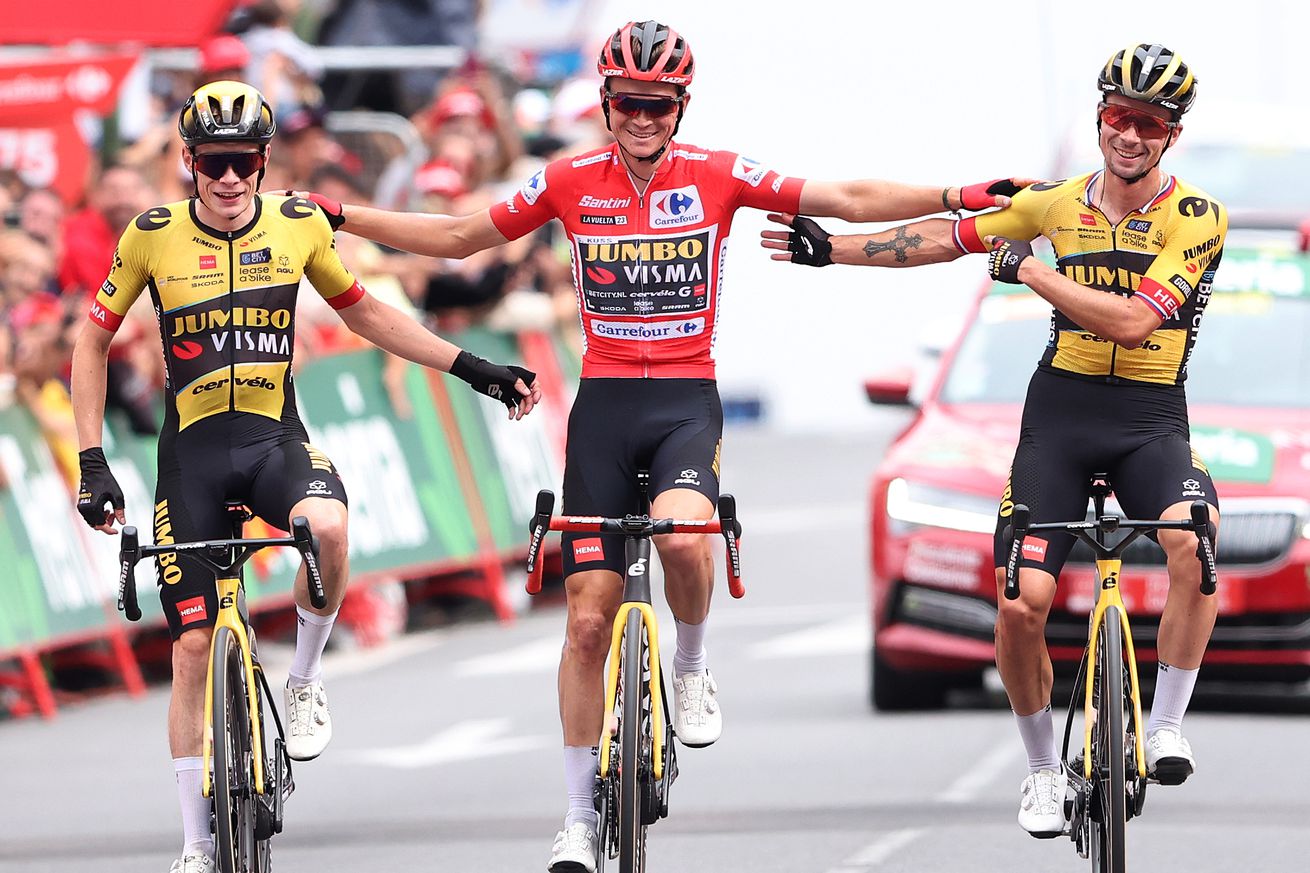Photo by Alexander Hassenstein/Getty Images
The U.S. has its unlikely next cycling superstar
When he crossed the finish line in Guadarrama at the end of Stage 20 of the 2023 Vuelta a España, Sepp Kuss was flanked by two men he usually is working for. On the one side, two-time Tour de France champion Jonas Vingegaard; on other, Primož Roglič, himself a three-time winner of the Vuelta.
The red race leader’s jersey belonged to neither of the two cycling superstars. It rested on Kuss’ shoulders, and will remain there throughout the race.
The 21st and final stage of the Vuelta, after all, will be little more than a procession — a celebration to cap off one of the most unlikely pro cycling stories in recent memory. Kuss, after all, had shown he had the quality to compete for a Grand Tour, one of the three biggest bike races in the world.
In fact, he raced all three of them this season. He helped Roglič win the Giro d’Italia in May, and Vingegaard the Tour de France two months later. With their Jumbo-Visma team taking both to Spain for the third and final Grand Tour of the year, the expectation was that it would be more of the same for Kuss: he would help them earn the win, just like he has throughout his career.
Despite being one of the best mountain climbers in the peloton, the 29-year-old has been a so-called domestique for much of his pro career. His job was to support the leaders, oftentimes being the one to set up the final attack.
He did it at the Giro and the Tour, and he was supposed to do it at the Vuelta as well. Then, everything changed.
The sixth stage of the race to Observatorio Astrofísico de Javalambre saw Kuss join a breakaway and suddenly gain more than two on the pre-race favorites and quote-on-quote serious general classification riders. The fact that he was allowed to go on the attack in the first place was a reflection of his status as a perceived non-threat to other riders and teams.
However, Kuss quickly proved that he had what it took to not just earn the red jersey — something he did on Stage 8 — but also keep it the rest of the way. Not only did he pass the high mountain tests without showing many weaknesses, he also rode the time trial of his life on Stage 10 in Valladolid.
Kuss lost 1:29 and no more than 1:13 on the top GC riders; he lost less than that on both Roglič (0:53) and Vingegaard (0:11).
This, in turn, meant that his team faced a problem of first-world proportions: throw the support behind nominal co-leaders Roglič and Vingegaard, or behind one of the most underrated riders in the sport? Publicly, the team and its top riders voiced support for the latter option but cracks in the plan started to show on Stage 17 to the mythical mountaintop finish at the Altu de L’Angliru.
Kuss entered the day 29 seconds ahead of second-placed Vingegaard and 1:33 ahead of Roglič in the third spot. Clearly the strongest team in the race, Jumbo-Visma was content to keep its riders 1-2-3 but there appeared to be no agreement who would end up where after Roglič upped the pace and eventually left everyone but Vingegaard behind — including Kuss, whose lead became smaller with every pedal stroke.
Roglič ended up winning ahead of Vingegaard, with the latter possibly on his way to pushing Kuss from the top spot. However, that did not happen: receiving some unexpected help from Bahrain-Victorious rider Mikel Landa, the Durango, CO native survived with only eight seconds to spare on Vingegaard.
The following stage, there was no drama. Vingegaard rode tempo for Kuss on the final climb in a show of support for the new leader.
Saturday’s stage was more of the same. As a result, Kuss is now on the verge of writing American cycling history: he will become just the fourth U.S. rider to win a Grand Tour, following the tracks of Greg Lemond, Andrew Hampsten, and Chris Horner.
Horner won the Vuelta exactly 10 years ago, in 2013. Now, it is Kuss’ turn to take the famous red jersey across the pond.













